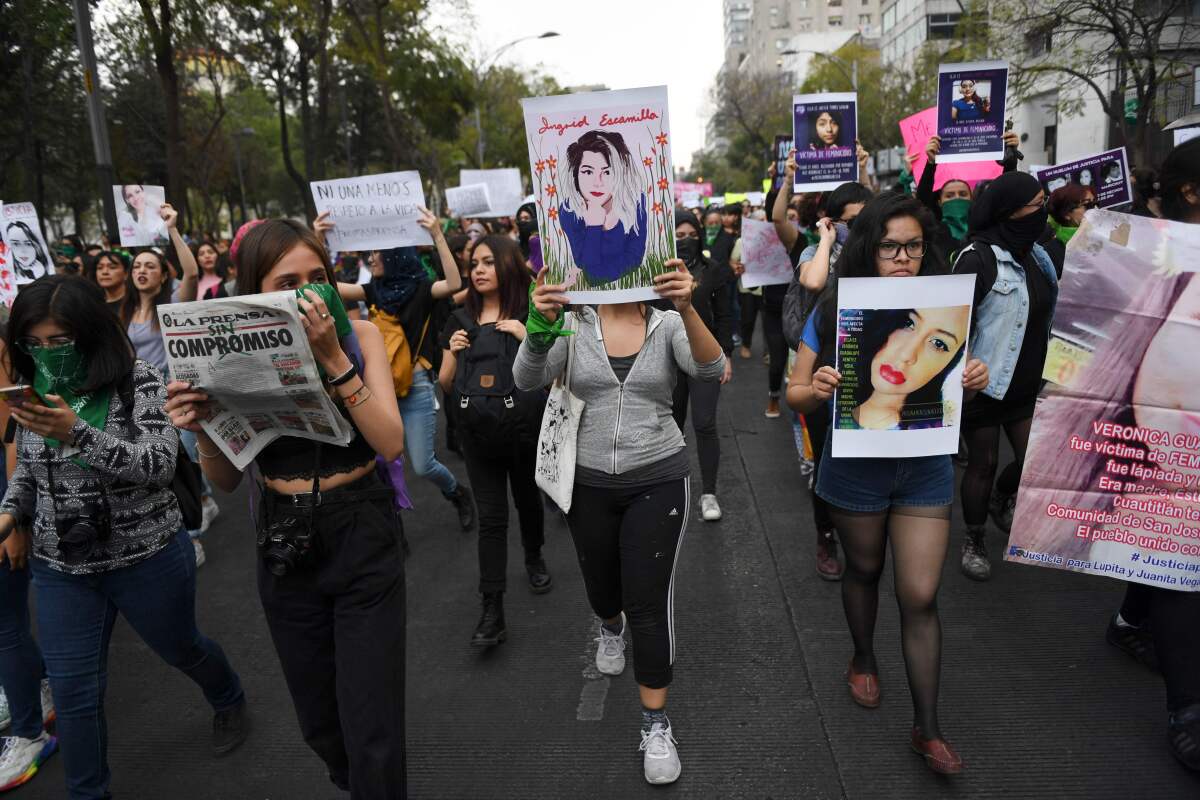MEXICO CITY — Mexican President Claudia Sheinbaum was strolling through her city’s capital this week, heading from one government office to another, when she stopped to take selfies with a crowd of admirers.
A man approached from behind, slipped his arm around Sheinbaum’s shoulder, leaned in to plant a kiss on her neck and briefly grabbed her chest before an aide pushed him away.
The groping incident, which was captured on video by bystanders Tuesday, sparked outrage nationally and put renewed focus on the rampant sexual harassment faced by women here.
Sheinbaum, who last year was sworn in as Mexico’s first female leader, has seized the chance to raise awareness about the issue.
“If they do this to the president,” she asked Wednesday, “what must happen to all the young women in the country?”
Speaking at her daily news conference, Sheinbaum said that she had filed a criminal complaint against her aggressor, whom authorities reported was drunk at the time of the incident and had been detained.
Sheinbaum said her government will also review state laws to ensure that street harassment is categorized as a crime throughout Mexico and launch a campaign to combat the phenomenon.
“I decided to file a complaint because this is something … all women in our country experience,” Sheinbaum said. “I experienced it before I was president. It shouldn’t happen. No one should violate our personal space. No man has the right to violate that space.”

Sheinbaum leaves a rally in Mexico City in 2023 while campaigning for president.
(Eduardo Verdugo / Associated Press)
Like her populist predecessor, Andrés Manuel López Obrador, Sheinbaum often walks the streets without bodyguards, saying she likes to be close to the people.
But the practice has come under scrutiny given the dozens of killings each year of Mexican political candidates and elected leaders. Over the weekend, the outspoken mayor of Uruapan, a city in Michoácan state, was gunned down at a public event celebrating the Day of the Dead holiday despite being protected by armed police and members of the National Guard.
Tuesday’s incident in Mexico City provoked outrage across the country, with many women saying it embodied the street harassment that is commonplace in many parts of the country.
“If the most powerful woman in Mexico experienced harassment, what can women who travel on public transportation or walk alone every day expect?” Congresswoman Ivonne Ortega wrote on X. “This is the reality that millions of women and girls face daily.”
Feminist social movements have gained ground in Mexico in recent years, sparked by the #MeToo movement in the United States and Mexico’s high rates of violence against women. Each spring, hundreds of thousands of protesters take to the streets to demand gender parity and policies that protect women’s lives.
Sheinbaum’s landslide victory in the 2024 presidential election highlighted the vast strides made by women in Mexican politics, a phenomenon aided by a law requiring that at least 50% of all candidates in federal, state and municipal elections are female.
Sheinbaum has frequently described her win as a victory for all women. “I did not arrive alone,” she says. “We all arrived.”
Yet violence against women persists, with an average of 10 women or girls slain nationwide each day, according to the government.
And street harassment is still pervasive. A few years ago, the hashtag #MiPrimerAcoso — “my first harassment” — went viral, with tens of thousands of women sharing stories of the first time they were touched, stared at or verbally harassed in the streets.
Writer Brenda Lozano said on X that Tuesday’s incident wasn’t due to alcohol or Sheinbaum’s lack of security. “The reasons she was harassed are patriarchy and sexism.”

Women march in Mexico City in a 2020 protest against gender violence.
(Pedro Pardo /AFP via Getty Images)
A United Nations report found that nearly half of Mexican women have been subjected to rape, groping or other forms of sexual violence. A 2014 survey of female transit riders in 16 cities around the world by the Thompson Reuters Foundation found that Mexico City had the biggest problem with sexual harassment, with 64% of respondents reporting having been victimized.
The Mexico City government has long provided women-only subway cars, and has even sought to combat harassment by arming female commuters with rape whistles. Some feminists oppose those measures, saying it puts the onus on women to protect themselves instead of pushing men to change their behavior.
Mexico City Mayor Clara Brugada said on Wednesday that the man who groped the president would be prosecuted to the full extent of the law.
“‘We’ve all arrived’ is not a slogan,” said Brugada, a member of Sheinbaum’s Morena party. “It’s a commitment to not look the other way, to not allow misogyny to remain hidden in custom, to not accept one more humiliation, one more abuse, one more femicide.”
While there were widespread expressions of support for Sheinbaum, there were also some on social media who criticized her for making too much of the incident. Others slammed Sheinbaum for smiling as she tried to slip away from the man’s grip, and for not pushing him away herself.
At her news conference, Sheinbaum said she hadn’t realized the extent of the harassment until she saw a video of what had happened.
She had chosen to walk between meetings rather than take a car for a simple reason. “We were running late,” she said. “It was faster.”
Also on Wednesday, Sheinbaum voiced support for Mexico’s Miss Universe representative, Fátima Bosch, who made headlines when she walked out of the competition Tuesday after being publicly berated by a male pageant official, who called her “dumb.”
Sheinbaum referenced a sexist saying that was once common in Mexico: “She’s prettier when she’s quiet.”
“Women,” Sheinbaum said, “are prettier when we raise our voices.”
Times staff writer Patrick J. McDonnell and Cecilia Sánchez Vidal in Mexico City contributed to this report.





